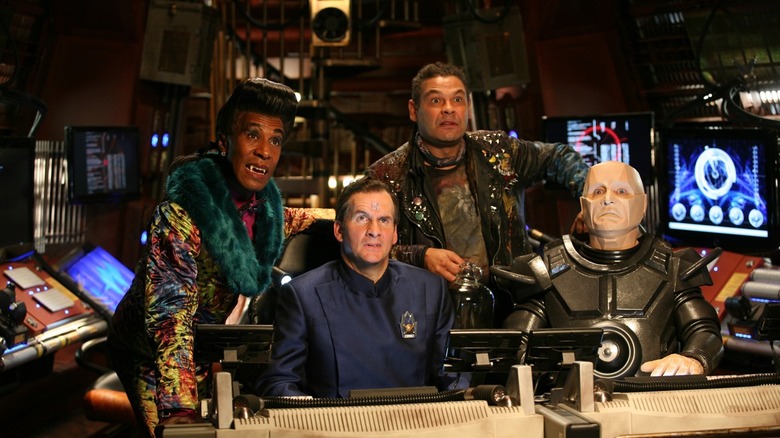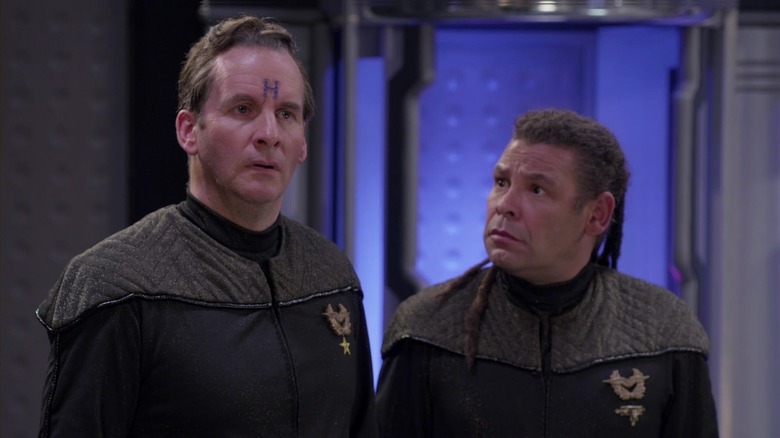Red Dwarf Could Have Been A Team-Up Between Alfred Molina And Alan Rickman
The premise for the long-running sci-fi sitcom "Red Dwarf" is as hilarious as it is existentially troubling. On the show's titular mining ship, a ne'er-do-well slugabed named Dave Lister (Craig Charles) is thrown into the ship's suspended animation prison for a minor infraction. When the ship's sentient computer Holly (Norman Lovett) releases Lister from captivity, he finds that two million years have passed following a radiation accident that killed the crew. The ship has been adrift in the cosmos ever since, and its exact location is unknown. In order to prevent Lister from going mad from loneliness, the computer creates an interactive hologram of his old roommate, a snotty, incompetent do-gooder named Arnold Rimmer (Chris Barrie). They hate each other but have to work together as they may be the last vestiges of humanity.
Also on the ship is a mysterious, well-dressed dandy with no name (Danny John-Jules) who is, in actuality, the eventual evolution of the ship's cats, and joining them all later will be the android Kryten (Robert Llewellyn) and Lister's longtime crush Christine Kochanski (Altered Images lead singer Clare Grogan, then Chloë Annett). Although they may be the last humans alive, none of the characters are particularly thoughtful or even necessarily all that intelligent. Hence, comedy.
"Red Dwarf" first began airing in 1988, and has returned periodically since, even after the occasionally decade-long hiatus (there was no new "Red Dwarf" from 1999 to 2009). The most recent reunion aired in 2020. The series has a sizeable cult following, given its Douglas Adams-like philosophical dryness, and "Star Trek"-like sci-fi stories, all juxtaposed with its slobby characters. You know who has watched "Red Dwarf" because they will recommend it to you with an obnoxious frequency.
Alternate universe Rimmer and Lister
Back when "Red Dwarf" was being cast in the late 1980s, co-creator Doug Naylor felt he had a hit on his hands ... a sentiment not shared by the BBC, the show's original network. Not only did Naylor like the premise, but he seemingly had two notable actors already in his corner. According to a 2019 interview with the Guardian, Naylor pointed out that Alan Rickman and Alfred Molina were definitely interested in playing Rimmer and Lister. Or rather, Lister and Rimmer, respectively, with both actors playing against type. Naylor said:
"We thought: 'How can this fail?' But the BBC rejected it three times. Alan Rickman and Alfred Molina liked the script so we considered casting them as Rimmer and Lister. Rickman wanted to be Lister because he thought playing Rimmer would be too easy. In the end, Craig Charles and Chris Barrie just seemed a better double act."
One might be able to easily picture Rickman, an actor quite good at playing intelligent but perpetually put-upon characters as the annoyed, uptight Rimmer, with the more outgoing Molina as Lister. No, Rickman wanted to play the "slobby" character, and Molina the "tightwad." And while the two might have acted well in a dramatic scene, Naylor indicated that they weren't as good comedic partners as the eventual cast.
Molina and Rickman would only work together once, and even then, they'd never act opposite one another. Each actor appeared in one of four 20-minute monologues, aired as a quarter of 1989 TV specials called "Revolutionary Witness." Each monologue was written by playwright Peter Barnes, each about the French Revolution. Rickman and Molina both had featured monologues, but, as stated, did not share the screen.
Luckily, Rickman, Molina, Charles, and Barrie have all done fine for themselves.

